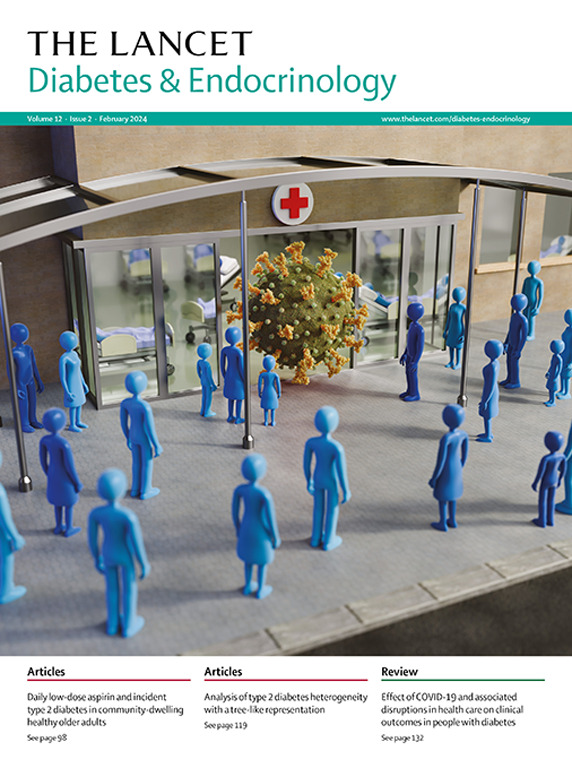Effects of GLP-1 receptor agonists on kidney and cardiovascular disease outcomes: a meta-analysis of randomised controlled trials
IF 44
1区 医学
Q1 ENDOCRINOLOGY & METABOLISM
引用次数: 0
Abstract
Background
GLP-1 receptor agonists reduce the risk of major adverse cardiovascular events (MACE) and can also have kidney benefits. However, whether GLP-1 receptor agonists improve clinically important kidney outcomes remains uncertain. We aimed to comprehensively assess the effects of GLP-1 receptor agonists on kidney and cardiovascular disease outcomes by performing a meta-analysis of randomised controlled trials.Methods
For this meta-analysis, we searched MEDLINE, Embase, and the Cochrane Central Register of Controlled Trials for randomised controlled trials that included at least 500 participants with type 2 diabetes, compared a GLP-1 receptor agonist with placebo with at least 12 months of follow-up, and reported a primary clinical kidney or cardiovascular outcome, from database inception to March 26, 2024. Post hoc, we included the SELECT trial (NCT03574597), which enrolled participants with cardiovascular disease and a BMI of 27 kg/m2 or more without diabetes. Study-level summary data were extracted independently by two authors for inclusion in this random-effects analysis. The main kidney outcome was a composite outcome, consisting of kidney failure (kidney replacement therapy or a persistent estimated glomerular filtration rate [eGFR] <15 mL/min per 1·73 m2), a sustained reduction in eGFR by at least 50% or the nearest equivalent, or death from kidney failure. The main cardiovascular outcome was MACE, consisting of cardiovascular death, non-fatal myocardial infarction, or non-fatal stroke. This study is registered with PROSPERO, CRD42024528864.Findings
Of the 5140 records identified through the literature search, 11 trials, involving 85 373 participants (29 386 female, 55 987 male), were included in the meta-analysis. In participants with type 2 diabetes (67 769), GLP-1 receptor agonists reduced the composite kidney outcome by 18% compared with placebo (hazard ratio [HR] 0·82, 95% CI 0·73–0·93; I2 =26·41%), kidney failure by 16% (HR 0·84, 0·72–0·99; I2 =0%), MACE by 13% (HR 0·87, 0·81–0·93; I2 =49·75%), and all-cause death by 12% (HR 0·88, 0·83–0·93; I2 =0%). The effect on the composite kidney outcome (HR 0·81, 95% CI 0·72–0·92; I2 =23·11%), kidney failure (HR 0·84, 0·72–0·98; I2 =0%), MACE (HR 0·86, 0·80–0·92; I2 =48·9%), and all-cause death (HR 0·87, 0·82–0·91; I2 =0%) was similar when the SELECT trial was included, with no evidence of heterogeneity between this trial and those including participants with type 2 diabetes (pheterogeneity >0·05). There was no difference in the risk of serious adverse events, including acute pancreatitis and severe hypoglycaemia, between the GLP-1 receptor agonist and placebo groups (risk ratio [RR] 0·95, 95% CI 0·90–1·01; I2 =88·5%). However, treatment discontinuation due to adverse events occurred more frequently in the GLP-1 receptor agonist groups (RR 1·51, 95% CI 1·18–1·94; I2 =96·3%).Interpretation
We found evidence that GLP-1 receptor agonists significantly reduce clinically important kidney events, kidney failure, and cardiovascular events.Funding
None.GLP-1 受体激动剂对肾脏和心血管疾病结果的影响:随机对照试验荟萃分析
背景GLP-1 受体激动剂可降低主要不良心血管事件(MACE)的风险,并对肾脏有益。然而,GLP-1 受体激动剂是否能改善临床上重要的肾脏预后仍不确定。我们旨在通过对随机对照试验进行荟萃分析,全面评估 GLP-1 受体激动剂对肾脏和心血管疾病预后的影响。方法在此次荟萃分析中,我们检索了 MEDLINE、Embase 和 Cochrane 对照试验中央注册中心的随机对照试验,这些试验纳入了至少 500 名 2 型糖尿病患者,比较了 GLP-1 受体激动剂和安慰剂,随访时间至少 12 个月,并报告了主要的临床肾脏或心血管结果,时间从数据库开始至 2024 年 3 月 26 日。事后,我们纳入了 SELECT 试验(NCT03574597),该试验招募了患有心血管疾病且体重指数(BMI)大于或等于 27 kg/m2 且未患有糖尿病的参与者。研究层面的汇总数据由两位作者独立提取,并纳入随机效应分析。主要肾脏预后为综合预后,包括肾衰竭(肾脏替代治疗或持续估计肾小球滤过率[eGFR] <15毫升/分钟/1-73平方米)、eGFR持续降低至少50%或最接近的等效值,或死于肾衰竭。主要心血管结局为MACE,包括心血管死亡、非致死性心肌梗死或非致死性中风。本研究已在 PROSPERO 注册,CRD42024528864.研究结果在通过文献检索确定的 5140 条记录中,有 11 项试验被纳入荟萃分析,涉及 85 373 名参与者(女性 29 386 人,男性 55 987 人)。在 2 型糖尿病患者(67 769 人)中,GLP-1 受体激动剂与安慰剂相比,可将肾脏综合结果降低 18%(危险比 [HR] 0-82,95% CI 0-73-0-93;I2 =26-41%),肾衰竭降低 16%(HR 0-84,0-72-0-99;I2 =0%),MACE 降低 13%(HR 0-87,0-81-0-93;I2 =49-75%),全因死亡降低 12%(HR 0-88,0-83-0-93;I2 =0%)。对综合肾脏预后(HR 0-81,95% CI 0-72-0-92;I2 =23-11%)、肾衰竭(HR 0-84,0-72-0-98;I2 =0%)、MACE(HR 0-86,0-80-0-92;I2 =48-9%)和全因死亡(HR 0-87,0-82-0-91;在纳入 SELECT 试验后,MACE(HR 0-86,0-80-0-92;I2 =48-9%)和全因死亡(HR 0-87,0-82-0-91;I2 =0%)的风险相似,没有证据表明该试验与纳入 2 型糖尿病患者的试验之间存在异质性(异质性为 0-05)。GLP-1受体激动剂组和安慰剂组发生急性胰腺炎和严重低血糖等严重不良事件的风险没有差异(风险比 [RR] 0-95,95% CI 0-90-1-01;I2 =88-5%)。然而,GLP-1受体激动剂组因不良事件而中断治疗的情况更为频繁(RR 1-51,95% CI 1-18-1-94;I2 =96-3%)。解释我们发现有证据表明,GLP-1受体激动剂可显著减少临床上重要的肾脏事件、肾衰竭和心血管事件。
本文章由计算机程序翻译,如有差异,请以英文原文为准。
求助全文
约1分钟内获得全文
求助全文
来源期刊

The Lancet Diabetes & Endocrinology
ENDOCRINOLOGY & METABOLISM-
CiteScore
61.50
自引率
1.60%
发文量
371
期刊介绍:
The Lancet Diabetes & Endocrinology, an independent journal with a global perspective and strong clinical focus, features original clinical research, expert reviews, news, and opinion pieces in each monthly issue. Covering topics like diabetes, obesity, nutrition, and more, the journal provides insights into clinical advances and practice-changing research worldwide. It welcomes original research advocating change or shedding light on clinical practice, as well as informative reviews on related topics, especially those with global health importance and relevance to low-income and middle-income countries. The journal publishes various content types, including Articles, Reviews, Comments, Correspondence, Health Policy, and Personal Views, along with Series and Commissions aiming to drive positive change in clinical practice and health policy in diabetes and endocrinology.
 求助内容:
求助内容: 应助结果提醒方式:
应助结果提醒方式:


